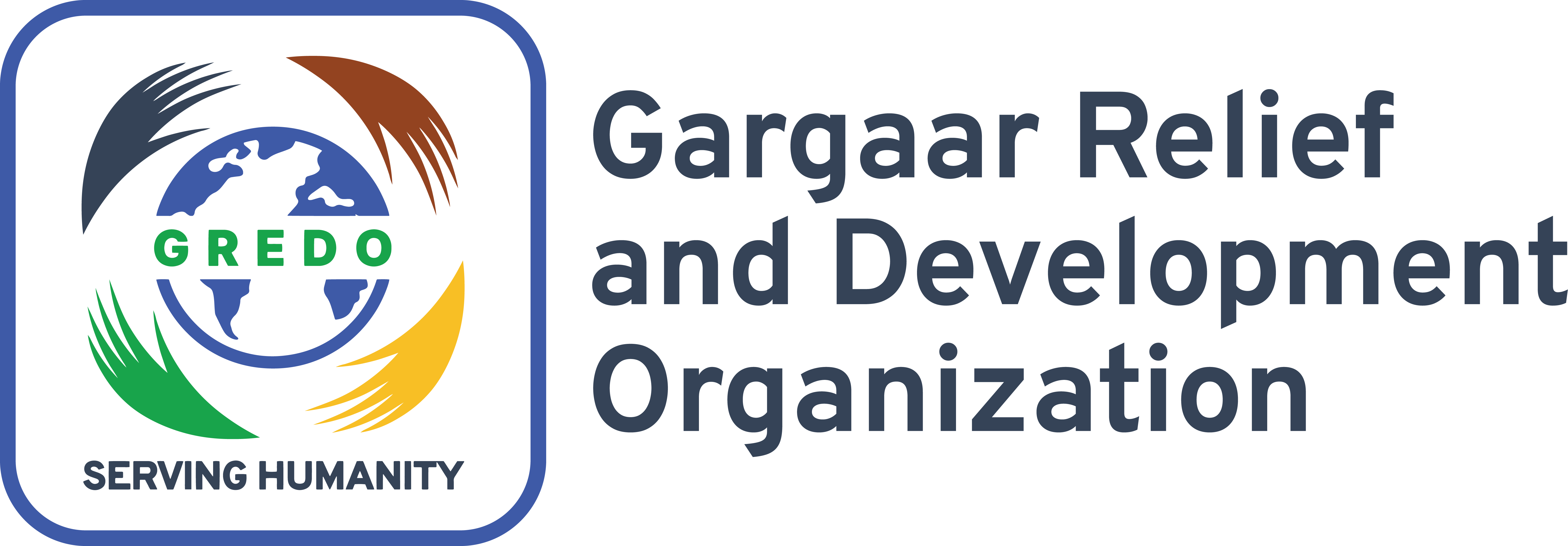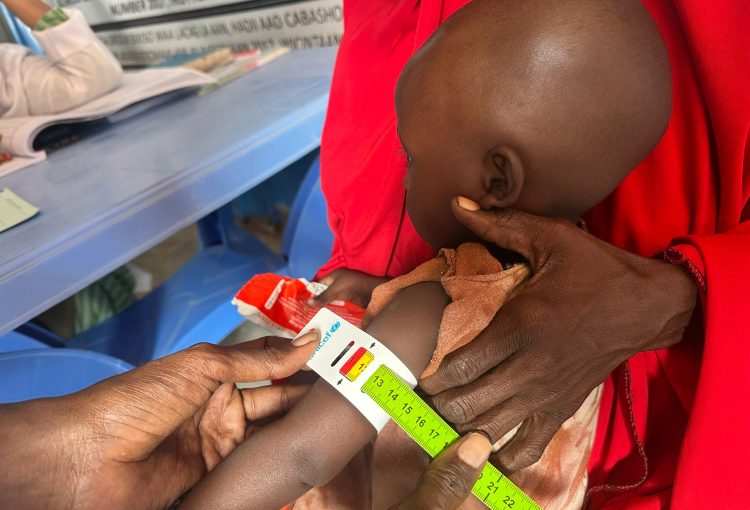 “Now I have the skills to measure my children’s MUAC and prevent malnutrition before it becomes dangerous.”
“Now I have the skills to measure my children’s MUAC and prevent malnutrition before it becomes dangerous.”
In the heart of Bula Samow IDP settlement in Marko, Lower Shebelle Region, lives Taliso Bashir Abukar, a 33-year-old mother of ten who has endured the harsh realities of drought, displacement, and conflict. Her youngest child, Fartun Ahmed Mohamed, only 23 months old, nearly lost her life to severe malnutrition before receiving care at Bula Baylow Health and Nutrition Center, a facility supported by the Start Network through the Solidarity Fund and implemented by GREDO Somalia.
Before her admission, Fartun was severely malnourished—weak, lethargic, and refusing to eat. She suffered from a persistent cough, diarrhea, and vomiting, which made it difficult for her to sleep or feed. For weeks, her mother watched helplessly as her daughter’s condition worsened. “I used to fear the drought and hunger,” Taliso said. “But nothing frightened me more than seeing my child slowly fade away before my eyes.”
Hope arrived when a community nutrition volunteer visited their settlement and recognized the danger signs. After explaining the situation, the volunteer referred Taliso to GREDO’s Bula Baylow Health Center. “When my neighbors saw how weak my daughter was, they told me to take her there quickly,” she recalled. “I walked more than five kilometers because I knew my daughter could die if I didn’t bring her here.”
At the facility, health workers diagnosed severe acute malnutrition. Fartun’s MUAC (Mid-Upper Arm Circumference) measured 11.1 cm, and she weighed just 6 kilograms. She was immediately enrolled in the Outpatient Therapeutic Program (OTP), where she began receiving Ready-to-Use Therapeutic Food (RUTF), medicine, and continuous medical follow-up. GREDO’s team monitored her progress closely, ensuring she received both medical care and nutritional counseling.
During her visits, Taliso participated in Family-Led MUAC training, learning how to screen her children for malnutrition using color-coded MUAC tapes. “Before this program, I felt helpless,” she said. “Now I have the skills to measure my children’s MUAC and prevent malnutrition before it becomes dangerous.”
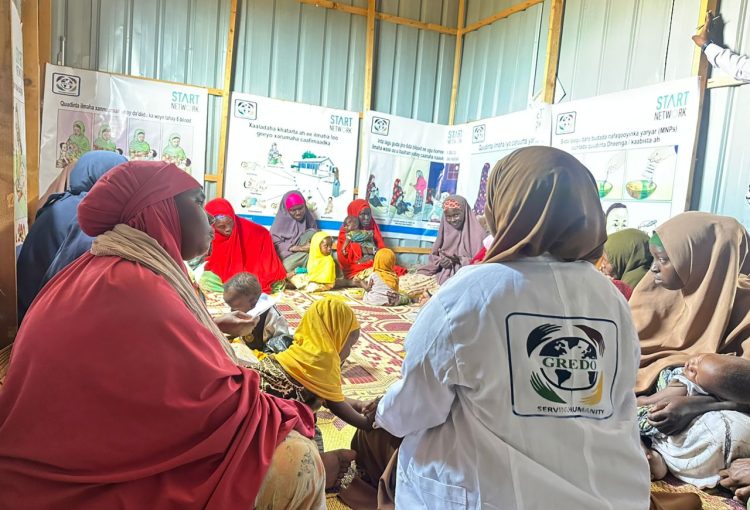 Community members, including Tasliso in a red veil, participate in an IYCF session.
Community members, including Tasliso in a red veil, participate in an IYCF session.
After several weeks of care, Fartun’s health began to improve. Her MUAC increased to 11.6 cm, and she was transferred to the Targeted Supplementary Feeding Program (TSFP) for continued nutritional support. With proper feeding, follow-up care, and hygiene practices at home, her condition strengthened further. Eventually, she reached a MUAC of 12.7 cm and a healthy weight of 8.9 kilograms, allowing her to be successfully discharged.
“Seeing her run and play again is more than I could ask for,” Taliso said, smiling. “I will always remember this care. I never imagined a small clinic could change our lives—GREDO brought life-saving hope to our community.”
Beyond nutrition treatment, GREDO addressed wider health and sanitation challenges facing families in the camp. Through its WASH (Water, Sanitation, and Hygiene) interventions, GREDO constructed three latrines and distributed hygiene kits, including soap, jerry cans, and water purification tablets. “The hygiene kit helped me keep my family clean,” said Taliso. “Before, we had frequent diarrhea, but now my children are healthier.” These efforts significantly reduced disease risks that often worsen malnutrition in IDP settings.
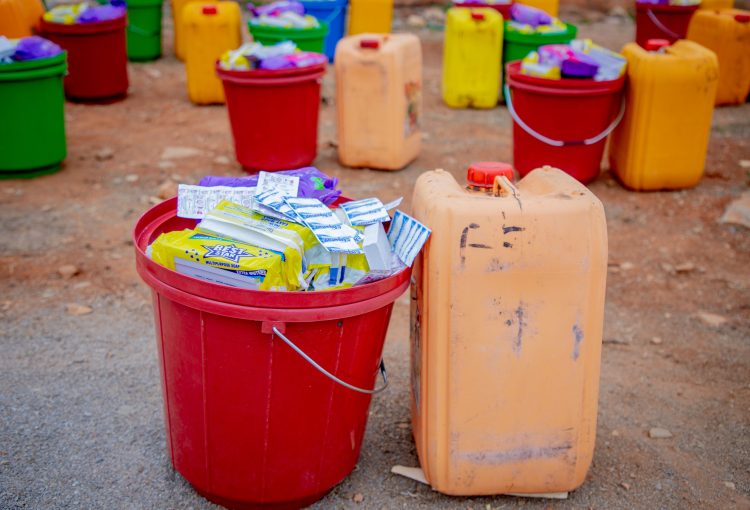 The hygiene kit distributed by GREDO.
The hygiene kit distributed by GREDO.
GREDO’s field staff continued routine hygiene promotion sessions, encouraging mothers to use safe water, wash hands regularly, and keep food areas clean. The combined approach of health, nutrition, and WASH support created an environment where children like Fartun could recover fully. “Without the GREDO health center, many children like mine would not survive,” Taliso emphasized. “We pray for these services to continue.”
The broader context of this story reflects a nationwide challenge. When funding cuts in early 2025 forced the closure of many health and nutrition facilities in Somalia, thousands of children were left without care. Pregnant and lactating women also faced rising risks of malnutrition and preventable diseases. The Start Network Solidarity Fund stepped in to bridge the gap, enabling GREDO to reopen critical health and nutrition centers in Baidoa and Marko.
Through this support, GREDO reinstated lifesaving services, including outpatient therapeutic feeding, maternal and child health care, immunization, and hygiene promotion. Community outreach teams resumed screenings, referrals, and education sessions to strengthen early detection of malnutrition. “I used to think malnutrition was a curse,” Taliso reflected. “Now I know it is something we can prevent and treat—with the right help.”
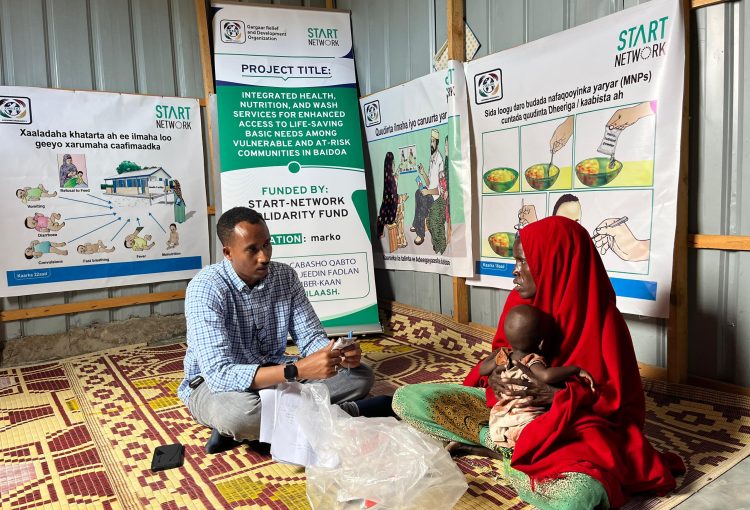 Abdullahi Mohamed, Health and Nutrition Manager, interviewing Taliso as she holds her child.
Abdullahi Mohamed, Health and Nutrition Manager, interviewing Taliso as she holds her child.
Today, Fartun’s recovery stands as a symbol of resilience, maternal determination, and effective community-based health care. It highlights how local action and global solidarity can transform lives in even the most challenging environments. As Taliso summed it up: “When my daughter was weak, neighbors advised me to bring her here. Now I advise other mothers the same—never wait. Seek help early, because every child deserves a chance to live.”
Project Information
This project, implemented by GREDO with support from the Start Network Solidarity Fund, restored essential health and nutrition services in Baidoa and Marko. It provided maternal and child healthcare, immunizations, and nutrition support while training caregivers to detect malnutrition early. By strengthening local capacity and coordination, the project improved community health and resilience.
